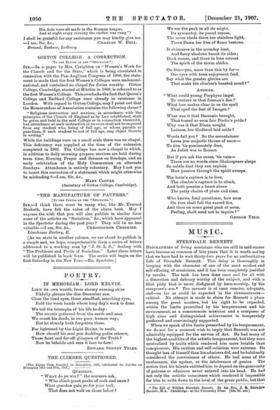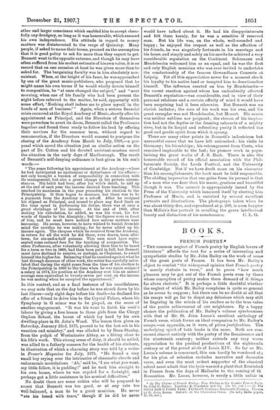MUSIC.
STERNDALE BENNETT.
BIOGRAPHIES of living musicians who are still in mid-career have become so common of late years that it is worth noting that we have had to wait thirty-two years for an authoritative Life of Sterndale Bennett. This delay is thoroughly in keeping with the character of one of the most modest and self-effacing of musicians, and it has been completely justified by results. The task has been done once and for all with a discretion and delicacy worthy of the subject, and with a filial piety that is never disfigured by hero-worship, by the composer's son.* The memoir is at once concise, adequate, and—as far as could be expected in the circumstances— critical. No attempt is made to claim for Bennett a place among the great masters, but his right to be regarded, within the limits prescribed by his temperament and his environment, as a consummate musician and a composer of high aims and distinguished achievement is temperately preferred and convincingly supported.
When we speak of the limits prescribed by his temperament., we do not for a moment wish to imply that Bennett was not admirably equipped for the service of Art. He had many of the highest qualities of the artistic temperament, but they were neutralised by traits which rendered him more lovable than conspicuous. His caution and self-criticism were extreme. He thought less of himself than his admirers did, and he habitually considered the convenience of others. He had none of the exuberance, the egoism, or the intolerance of genius. The notion that his talents entitled him to depend on the generosity of patrons or admirers never entered into his bead. He had not only the artistic conscience which rendered it impossible for him to write down to the level of the gross public, but that
• The Lift, of Williams Sterndale Bonnett, By his Sou, J. B. &crackle Bennett, M.A. Cambridge: at the University Press. [lb. 6d. net.]
other and larger conscience which enabled him to accept cheer- fully any drudgery, so long as it was honourable, which ensured his own independence. His attitude in regard to money matters was disinterested to the verge of Quixotry. Many people, if asked to name their terms, proceed on the assumption that it is good policy to ask for more than they expect to get. Bennett went to the opposite extreme, and though he may have often suffered from his modest estimate of his own value, it is on record that on one occasion at least he was given more than he asked for. The bargaining faculty was in him absolutely non- existent. When, at the height of his fame, he was approached by one of the great music-publishers, who proposed that he might name his own terms if he would wholly devote himself to composition, he "at once changed the subject," and "next morning, when one of his family who had been present the night before referred to the matter, he said, apparently with some effort, Nothing shall induce me to place myself in the hands of men of business." Again, when a serious financial crisis occurred at the Royal Academy of Music, shortly after his appointment as Principal, and the Directors of themselves were powerless to avert its doom, Bennett called the Professors together and found them ready to follow his lead by offering their services for the summer term, without regard to remuneration, if the Directors would consent to postpone the closing of the Academy from March to July, 1868,—a pro- posal which saved the situation just as similar action on the part of Dr. Cotton and his devoted assistant-masters saved the situation in the early days of Marlborough. The result of Bennett's self-denying ordinance is best given in his son's words :—
"The years following his appointment at the Academy—where he had anticipated no excitement or disturbance of his affairs— not only brought a burden of responsibility in connection with its management, but also a great change in his private circum- stances. His habit had been, after his wife's death, to add np at the end of each year the income derived from teaching. This reached its maximum in the year preceding his election to the Principalship. It then began to decrease, but there was to be a payment from the Academy as a set-off. After he resigned his stipend as Principal, and ceased to place any fixed limit on the time spent in performing his duties, there was at once a great shrinkage of his income. At the end of 1869, after making his calculation, he added, as was his wont, his few words of thanks to the Almighty ; but the figures were in front of him, and he must have noticed how serious matters worn becoming. He seems, however, to have wished to banish from his mind the sacrifice he was making ; for he never added up his income again. The cheques which he received from the Academy, in return for all the work he did there, were drawn, term after term, for six-and-a-half guineas. This sum must have repre- sented some reduced fees for the teaching of composition. The other Professors, after voluntarily allowing their fees to be taxed for a term or two in 1868, had then been paid in full, but Bennett must have declined to receive, or perhaps, as Chairman, to award himself the higher fee. Balancing what he received against what he lost through decrease of other work, the writer has carefully calcu- lated that during the eight years from the time of his election to the Principalship in 1866 to the time when he was again assigned a salary in 1874, his position at the Academy cost him an annual average sum equivalent to twenty-seven per cent. on the income he was making when he accepted the appointment."
In this context, and as a final instance of his unselfishness, we may note that on the day before he was struck down by his last illness—only eight days before his death—he declined the offer of a friend to drive him to the Crystal Palace, where his Symphony in G minor was to be played, on the score of another engagement. "It was his wont to finish his week's labour by giving a free lesson to three girls from the Clergy Orphan School, the house of which lay hard by his own dwelling-place in St. John's Wood. The lesson thus given on Saturday, January 23rd, 1875, proved to be the last act in his vocation and ministry," and was alluded to by Dean Stanley, from the pulpit of Westminster Abbey, as a fitting close to
his life's work. This strong sense of duty, it should be added, was allied to a fatherly concern for the health of his students, in illustration of which a charming story was told by a writer in Fraser's Magazine for July, 1875. "He found a very small boy crying over the intricacies of chromatic chords and enharmonic modulations. 'Ah,' said he, 'I see what you want,
my little fellow, it is pudding!' and he took him straight to his own house, where he was regaled for a fortnight, and perhaps got a little assistance in his musical difficulties."
No doubt there are some critics who will be prepared to assert that Bennett was too good, or at any rate too well-balanced, a man to be a great musician. He never "ate his bread with tears," though if he did he never
would have talked about it. He had his disappointments and felt them keenly, for he was a sensitive if reserved man. But his life was, on the whole, well-rounded and happy ; he enjoyed the respect as well as the affection of his friends, he was singularly fortunate in his marriage and his home, and simply and solely on his merits he achieved a very considerable reputation on the Continent. Schumann and Mendelssohn welcomed him as an equal, and he was the first and only English musician who was ever invited to undertake the conductorship of the famous Gewandhaus Concerts at Leipzig. Yet all this appreciation never for a moment shook his loyalty to his native land or tempted him to denationalise himself. The influence exerted on him by Mendelssohn- the recent reaction against whom has undoubtedly affected Bennett's reputation—was considerable, and in view of their personal relations and a certain affinity of mind it would have been surprising had it been otherwise. But Bennett was no slavish imitator; the core of his work was his own, and his great exemplar was not Mendelssohn, but Mozart. His music was neither sublime nor poignant ; the stream of his inspira- tion had not the depths or the foaming cataracts of a mighty river, but in its limpid and refreshing purity it reflected the good and gentle spirit from which it sprang.
There are many other points in Bennett's industrious but uneventful career that we have left untouched : his visite to Germany; his friendships ; his estrangement from Costa, who remained implacable to the last ; his pioneer work in popu- larising the great works of J. S. Bach. There is also the honourable record of his official association with the Phil- harmonic Society, the Leeds Festival, and the University of Cambridge. But if we have dwelt more on his character than his accomplishments, the book must be held responsible. The abiding impression that one gains from its perusal is that of a man who was finer than his music, gracious and beautiful though it was. The memoir is appropriately issued by the Press of the University which honoured itself by electing him Professor of Music, and is enriched by several excellent portraits and illustrations. The photograph taken when be was about thirty-five, and reproduced at p. 209, is oven happier than Millais's fine portrait in recalling the grave intellectual beauty and distinction of his countenance. C. L. G.















































 Previous page
Previous page